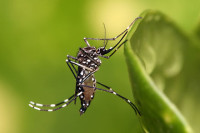10 Feb Link Between Zika Virus, Microcephaly, Stillbirths and Miscarriages
MedicalResearch.com Interview with:
Nancy Dirubbo, DNP, FNP, FAANP, Certificate in Travel Health, American Association of Nurse Practitioners (AANP) Fellow
Cindy Cooke, DNP, FNP-C, FAANP, American Association of Nurse Practitioners (AANP) President of the Board
Medical Research: Can you provide some background on what is the Zika virus?
Response: Zika virus was first found in monkeys in the Zika Forest of Uganda in 1947 during a research project on mosquito borne viral diseases. From Africa, it spread to India, Indonesia and South East Asia over the next 20-30 years. Not much attention was paid to this illness, as it is often asymptomatic (perhaps as much as 80% of all cases). It causes few symptoms in adults (mild rash, conjunctivitis and headache) and so is often underdiagnosed or misdiagnosed as other self-limiting, viral diseases. Then fast forward to 2015, when a sudden increase in infants born in Brazil with microcephaly occurred and a connection was made with a sharp increase in Zika viral infections, even though the direct mechanism for causing this birth defect is not known. In 2014, there were less than 150 cases of microcephaly in Brazil, and by October 2015, there were 4,700 cases reported.
Medical Research: What is the concern regarding pregnant women and their babies?
Response: The concern for pregnant women is that there appears to be a link between Zika virus and microcephaly, still birth and miscarriages. Children who do survive have severe intellectual disabilities. The virus is most often transmitted by mosquitos, but may also be sexually transmitted. According to the CDC, “Sexual transmission of Zika virus is possible, and is of particular concern during pregnancy. Current information about possible sexual transmission of Zika is based on reports of three cases.” The CDC also recommends, “Men who reside in or have traveled to an area of active Zika virus transmission who have a pregnant partner should abstain from sexual activity or consistently and correctly use condoms during sex (i.e., vaginal intercourse, anal intercourse or fellatio) for the duration of the pregnancy.” It has yet to be determined if Zika virus can be transmitted in other ways, including blood transfusions.
Medical Research: Do we know when it might be safe to conceive after you have a Zika infection?
Response: We do not know for sure when it is safe to conceive after being infected with Zika, and we may not know for some time to come.
Medical Research: Is there any test or treatment for the virus?
Response: There is a serological (blood) test for Zika virus. There is no specific treatment.
MedicalResearch: What should clinicians and patients be aware of regarding the Zika virus?
Response: Providers should routinely include information about foreign travel in health histories to screen for those at risk from many of the diseases that are spread internationally. All women of childbearing age who wish to travel short term or long term to tropical or subtropical locations should be advised to use the most effective methods of contraception as possible, including subdermal implants and intrauterine devices. This is especially important to college students who may be spending a semester or year abroad in high-risk areas. Providers need to be able to counsel patients on effective insect repellents (DEET and Picardin) and products to treat clothing against mosquitos (permetherin). Prenatal providers may need to perform serological testing and ultrasounds on high-risk patients.
MedicalResearch: Is there anything else you would like to add?
Response: Providers need to stay informed and up to date as new information develops on this infection. They can do so by subscribing to MMWR at www.cdc.gov/mmwr
and following the CDC on social media and referring their patients to accurate informational sites such as http://wwwnc.cdc.gov/travel/page/zika-travel-information.
Further thoughts:
The Zika virus is spread by the Aedes aegypti mosquito, but is it possible that it could be spread by other mosquitoes, such as the Asian tiger mosquito whose habitat includes more temperate areas. If so, then this will increase the risk of Zika infection spreading to more temperate climates in the US and parts of Europe.
It is also important to remember that mosquitoes can’t read maps, and it takes time for low resource countries to test, diagnose and report this infection so that the CDC can issue travel warnings. Many of the low resource countries affected will face financial hardship if tourism dollars disappear. Women residing in these countries have little access to reliable contraception, struggle to afford insect repellent and don’t have access to abortion services. There is also little support to help care for the complex health needs of children born with microcephaly.
India is working on a vaccine that they hope to get to market in the next year. FDA approval of a Zika vaccine in the US will take years.
[wysija_form id=”5″]
Citation:
Dr. Nancy Dirubbo and Dr. Cindy Cooke (2016). Link Between Zika Virus, Microcephaly, Stillbirths and Miscarriages
Last Updated on February 10, 2016 by Marie Benz MD FAAD

